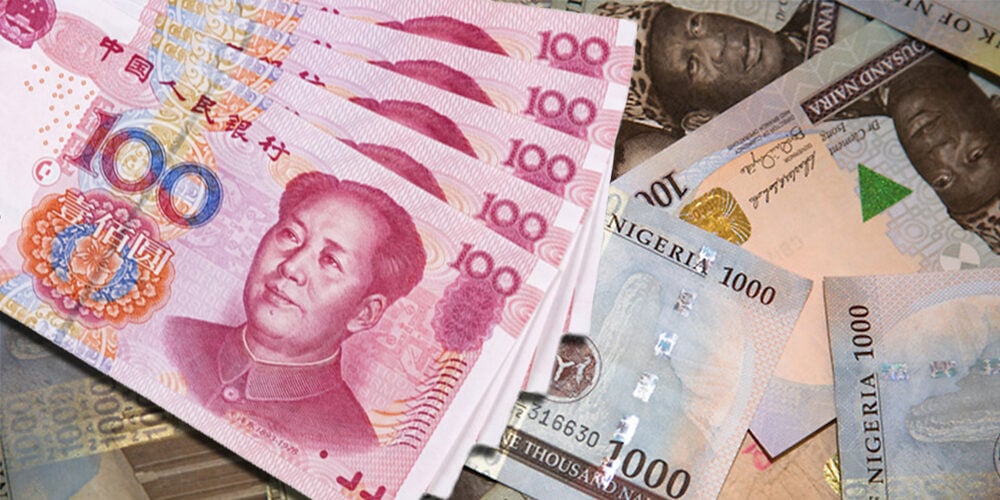By EDITOR-IN-CHIEF
Copyright nigeriastandardnewspaper

Nigerians buying goods from China now pay in Renminbi, Chinese importers of Nigerian goods can pay in Naira
*Cross-border payments between Nigeria and China become a vital part of Africa’s most significant trade relationships
*Central Bank of Nigeria, People’s Bank of China made liquidity available in respective currencies for facilitation, promotion of trade and investments between in the two countries
*Performance of CNY to NGN in the last 30 days saw a 30 day high of 216.7510 and a 30-day low of 211.0020, meaning 30-day average was 213.2243
*BY AMINA RILWAN/ANTI-FRAUD CRIME Correspondent, Reporting LIVE from Beijing, NAIJA STANDARD Newspaper Inc USA
The relevance of the United States dollars in Foreign Exchange (FOREX) in currency transaction between the Federal Republic of Nigeria and the People’s Bank of China seems to have been pushed to the back burner as the business relationship in the two nations has been running seamlessly and this has added more stability to Nigeria’s leger tender-Naira. Nigerians buying goods from China now pay in Renminbi, Chinese importers of Nigerian goods can pay in Naira.
For the records, Nigeria and China first signed the currency swap agreement in April 2018 for a period of three years amid persistent dollar shortages across the country due to excessive demand for the greenback.
China is Nigeria’s biggest trading partner ahead of the United States. Nigeria imported N14.14 trillion worth of goods and services from China and exported goods worth over N3 trillion in 2024.
The deal allows both the Central Bank of Nigeria (CBN) and the People’s Bank of China (PBoC), which are executing the agreement on behalf of their respective countries, to swap a maximum amount of $2.5 billion.
As part of the regulation then released by Nigeria’s apex bank, the CBN, and PBoC were expected to make available liquidity in their respective currencies for the facilitation and promotion of trade and investments between the two countries through the purchase, sale, and subsequent repurchase and resale of the Chinese Yuan against the Naira and vice versa.
The currency deal was designed to provide naira liquidity to Chinese businesses and yuan liquidity to Nigerian businesses, while reducing their dependence on the dollar as a basis for transactions.
Cross-border payments between Nigeria and China have become a vital part of one of Africa’s most significant trade relationships. Over the past three decades, China has cemented its position as Nigeria’s largest trading partner, supplying the bulk of consumer goods that fuel Nigeria’s import-heavy economy.
The performance of CNY to NGN in the last 30 days saw a 30 day high of 216.7510 and a 30-day low of 211.0020. This means the 30-day average was 213.2243. The change for CNY to NGN was -1.63. And 1 CNY = 211.013 NGN.
The performance of CNY to NGN in the last 90 days saw a 90 day high of 219.9930 and a 90-day low of 211.0020. This means the 90-day average was 214.3925. The change for CNY to NGN was -3.78.
But this relationship has evolved far beyond container shipments and market stalls. As trade volumes increased, so did the need for a more stable and efficient pathway for financial transactions.
This led to the start of a bilateral partnership when Nigeria began negotiations for a currency swap with China in 2016. This was a strategic move influenced by China’s growing dominance in global trade and finance.
That same year, the International Monetary Fund (IMF) included the Chinese yuan in its basket of Special Drawing Rights (SDRs), recognising China’s expanding influence in the global economy.
By 2018, Nigeria and China signed a $2.5 billion currency swap agreement, allowing both countries to settle trade in their local currencies, Naira and Chinese yuan, rather than relying on the U.S. dollar.
Nigeria has reportedly renewed a currency swap deal worth $2 billion with China in a bid to strengthen bilateral trade and investment between both countries.
As part of the deal, Nigeria committed to holding 4.5% of its foreign reserves in yuan. The goal was simple: reduce transaction costs, ease dollar demand, and make cross-border payments faster and more accessible for businesses on both sides.
That agreement has since expired and renewed as Nigeria’s President Bola Ahmed Tinubu strive to stabilise the Naira and support the ease of doing business.
For the private sector, especially small and medium-sized importers, this type of bilateral relationship offers much-needed relief. When transactions are routed through the dollar, businesses can lose as much as 20% in exchange rate losses and bank fees. Settling directly in Naira-yuan pairs offers a more affordable alternative.
In December 2024, the Federal Government was reported to have renewed the currency swap deal worth about $2 billion with China in a bid to strengthen bilateral trade and investment between both countries.
In 2011 the Central Bank of Nigeria (CBN) decided to convert a portion of its external reserves into the Chinese currency, Renminbi (RMB). At that time Nigeria was one of the first countries in the world to do this. This policy decision was appropriate because:
The RMB was becoming more of an international currency, given China’s expanding influence in global trade; and
China is one of Nigeria’s largest trading partners. Indeed, as of end-2016, bilateral trade between both countries stood at about US$14.7 billion. In fact, imports from China accounted for 35 percent of total imports, with the second country (India) accounting for only 5.8 percent.
Currently, about 4.5 percent of Nigeria’s external reserves is denominated in Renminbi. In further reflection of these realities, the Central Bank of Nigeria (CBN) decided to pursue a Bilateral Currency Swap Agreement with China’s Central Bank, the People’s Bank of China (PBOC) to broadly ease trade transactions between both countries by avoiding the use and/or influence of a third currency. After more than two years of painstaking negotiations, this agreement was signed by the CBN and the PBOC on Friday 27 April 2018. Nigeria becomes the 3rd African country to have a Currency Swap Agreement with the People’s Bank of China.
*How Will this Agreement Work?
It makes a certain amount of Renminbi available to the CBN and Naira equivalent available to the PBOC, using the 2014 Trade Balances between both countries. The CBN will then make the Renminbi available to Nigerian banks, who can on that basis open Renminbi Letters of Credit (LC) for Nigerians wishing to do business with Chinese counterparties. This option (Renminbi-denominated transactions) is now available in addition to the current practice of exclusive use of US Dollars for such trades/transactions. In effect, Nigerians buying goods from China can now pay in Renminbi, while Chinese importers of Nigerian goods can also pay in Naira; instead of in dollars. The incoming Renminbi from Chinese importers will go into the CBN’s Renminbi Reserves and place it in a better position to honour its obligation to repay to China the RMB value of the Swap Facility when it is due.
The CBN will on its own part encourage Nigerians to use Renminbi to pay for imports from China, which should reduce the pressure on US dollars. Chinese Companies are also likely to eagerly take advantage of the opportunity to pay for imports from Nigeria in either currency. The RMB would now also be available for prospective Foreign Direct and Foreign Portfolio Investors.
*How much will the Chinese Swap Facility be worth?
The Swap Facility is valued at RMB15 billion, which is equivalent to about US$2.5 billion.
*Why is the Renminbi important?
The Renminbi is one of the most widely used currencies in the world, on account of China’s status as the world’s largest exporter of goods to other countries. Reflecting on this reality, the currency has begun to earn the confidence of global markets. In October 2016, it was admitted by the International Monetary Fund (IMF) as the fifth member – joining the U.S. Dollar, Euro, Yen and Pound Sterling – of the basket of currencies that constitute the ‘Special Drawing Right’, the IMF’s supplementary international reserve asset. This implies that other countries can now hold the Renminbi as part of their Foreign Exchange Reserves.
*When will the Swap Amount be due for repayment by Nigeria?
This agreement is valid for an initial period of three years, which the two banks can extend by mutual consent. Drawings can be reviewed severally within this three-year period.
*Potential Benefits for Nigeria:
It will reduce demand for US Dollars, and as such, reduce the pressure on the Dollar Naira Exchange Rate. Every Nigerian who does business in China, and whose suppliers agree to receive payment in Renminbi, can now pay in Renminbi, instead of the Dollar.
Since Chinese importers of Nigerian goods can now, as part of this arrangement, pay for their imports in Renminbi, this arrangement has the potential of boosting Nigeria’s exports to China (currently Nigeria runs a large trade deficit with China), and therefore ultimately redressing the trade imbalance.
It will increase the speed, volume and convenience of business transactions between Nigeria and China and help safeguard Nigerian businesses from the exchange unpredictability that arises when Naira-Renminbi transactions have to go through an intermediate conversion into USD.
*How will Nigeria source the Renminbi to make this Agreement operational?
For a start, the Agreement provides for the PBOC to swap RMB16 billion in exchange for N720 billion from the CBN. To the extent that Chinese businesses pay for their imports from Nigeria with RMB, this stock will rise.
*Relative stability of the exchange rate:
Recently, the President of the Association of Bureau De Change Operators of Nigeria (ABCON), Aminu Gwadebe reportedly highlighted the relative stability of the exchange rate recently and attributed it to some developments in the forex market.
He said, ‘’The Chinese are now collecting Naira for Yuan, doing P2P. Go to any mining factory and you will see a Chinese man in Nigeria. Is it double? The two things are working on that, which CBN is not doing.
“I told you of the Chinese, mining, Yuan, Naira. Then is it P2P? These two factors are working right now. There is a lot of liquidity in the market.
On the Chinese swap deal putting less pressure on the naira, the ABCON boss said, “Definitely now. It is making it now. They are collecting Naira for yuan, give you Naira and go to China. That deal has even expired. That one, you can do it even officially. But now, it has even expired.
“I think they are trying to renew it somehow. I don’t even follow it because I know it is already a failure. I don’t even follow it, honestly.”
Gwadebe further pointed out that Nigerians who are buying goods from China do not need dollars, as all they need is to buy yuan.
He said, “If you go to China and if a Chinese man is importing, I mean a Nigerian importing from China, all he needs is yuan to settle his affairs. You don’t even need dollars now. Why are you going into third currencies? Buy Naira, dollar, dollar, yuan. Why am I doing that now? Does that make sense to me as a businessman?
“Does that make sense for me now? Yeah, it doesn’t make sense to me. Why am I converting, I mean, converting from Naira dollar? No, no, not making sense. You collect my Naira for yuan in China, then what am I talking about? Well, no. I don’t go through dollars.
“I have removed the dollar. Exchange rate leaks. Fluctuations. I don’t want it. I don’t want it. Nobody is doing that now. Those who know anyway. And they will give you the Naira here. This is your Naira.
“Somebody was telling me in China, there is like a Nigerian market. You will see how they collect Naira, sell dollars. Also, Yuan.”
Making his own contribution, another currency trader, Yusuf, noted that although the swap agreement between Nigeria and China has some influence on the exchange rate, the impact may not be strong in the day-to-day market operations.
He pointed out that the reality is that most Nigerians still prefer the US dollar because it is more widely accepted globally.
He said, ‘’Yes, the swap agreement between Nigeria and China has some influence on the foreign exchange, but the effect is not that strong in day-to-day market operations. The main idea behind the swap was to reduce dependence on the U.S. dollar for trade between Nigeria and China. So, for businesses importing goods from China, instead of looking for scarce dollars, they can settle transactions in yuan (RMB).
“But here’s the thing: in reality, many Nigerian traders still prefer USD because it is more widely accepted globally. Even Chinese suppliers often ask for dollars, not naira or yuan. So, the swap is helpful, but on the ground, its impact on the black market is very small. The dollar is still what people prefer.”
On person-to-person transactions, Yusuf said that the swap deal has almost no impact on everyday transactions like school fees abroad, medical bills, remittances, or even sending money to family outside Nigeria.
He noted that you can’t easily walk into a BDC and buy yuan like you do with dollars, pounds, or euros. ‘’Even if yuan is available, it’s not liquid in the street market,” he said.
*What you should know:
The currency swap deal between Nigeria and China is significant as it was to allow trading between the two countries to be done directly in their local currencies without any need for the dollar.
This development was to improve bilateral trade between the two countries and engender foreign investment flows and economic cooperation beneficial to both parties.
The significant cut in dollar demand by firms and investors doing business across the two countries will help protect their financial markets and boost their respective foreign reserves.
However, there are still concerns over the ability of the currency swap agreement to fully address the challenge of dollar demand by importers, since imports from China are reported to account for only 20% of Nigeria’s annual total imports.
DONATE TO HELP BUILD A SPECIAL APPS FOR JOURNALISTS AGAINST LIVER ELEVATION & KIDNEY FAILURE:
CERTAINLY, Good journalism costs a lot of money. Without doubt, only good journalism can ensure the possibility of a good society, an accountable democracy, and a transparent government. We are ready to hold every corrupt government accountable to the citizens. To continually enjoy free access to the best investigative journalism in Nigeria, we are requesting of you to consider making a modest support to this noble endeavor.”
By contributing to NAIJA STANDARD NEWSPAPER, you are helping to sustain a journalism of relevance and ensuring it remains free and available to all without fear or favor.
Your donation is voluntary — please decide how much and how often you want to give. For offline donation, email: letters@nigeriastandardnewspaper.com or call +2347076577445 (Nigeria) or WhatsApp American Roaming Mobile Number: +16825834890 (United States of America)



